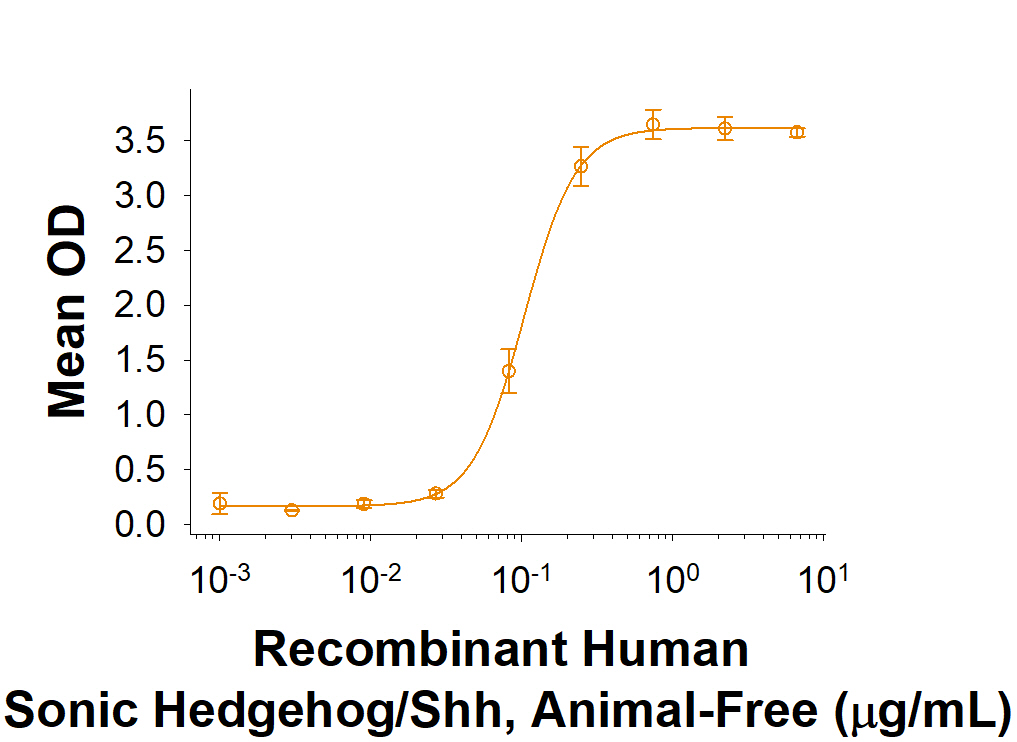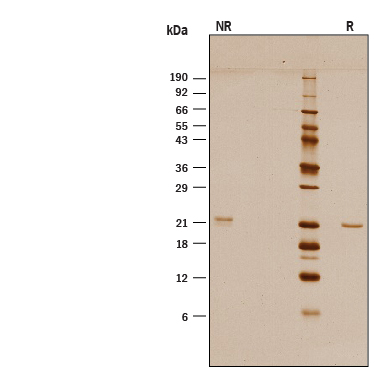Recombinant Human Sonic Hedgehog/Shh (C24II) Animal-Free, CF
Recombinant Human Sonic Hedgehog/Shh (C24II) Animal-Free, CF Summary
Product Specifications
Cys24-Gly197 (Cys24Ile-Ile), with an N-terminal Met
Produced using non-animal reagents in an animal-free laboratory.
Analysis
Product Datasheets
Carrier Free
CF stands for Carrier Free (CF). We typically add Bovine Serum Albumin (BSA) as a carrier protein to our recombinant proteins. Adding a carrier protein enhances protein stability, increases shelf-life, and allows the recombinant protein to be stored at a more dilute concentration. The carrier free version does not contain BSA.
In general, we advise purchasing the recombinant protein with BSA for use in cell or tissue culture, or as an ELISA standard. In contrast, the carrier free protein is recommended for applications, in which the presence of BSA could interfere.
AFL1845
| Formulation | Lyophilized from a 0.2 μm filtered solution in PBS and NaCl. |
| Reconstitution | Reconstitute at 100-200 μg/mL in PBS, and allow up to 24 hours at 2 to 8 °C for complete reconstitution. |
| Shipping | The product is shipped with polar packs. Upon receipt, store it immediately at the temperature recommended below. |
| Stability & Storage: | Use a manual defrost freezer and avoid repeated freeze-thaw cycles.
|
Scientific Data
 View Larger
View Larger
Animal-Free™ Recombinant Human Sonic Hedgehog/Shh (Catalog # AFL1845) induces alkaline phosphatase production by the C3H10T1/2 mouse embryonic fibroblast cell line. The ED50 for this effect is 0.1-0.4 μg/mL.
 View Larger
View Larger
1 μg/lane of Animal-Free™ Recombinant Human Sonic Hedgehog/Shh (C24II) Protein (Catalog # AFL1845) was resolved with SDS-PAGE under reducing (R) and non-reducing (NR) conditions and visualized by silver staining, showing bands at 22 kDa.
Reconstitution Calculator
Background: Sonic Hedgehog/Shh
Sonic Hedgehog (Shh) is expressed in embryonic tissues that are critical for the patterning of the developing central nervous system, somite, and limb. It is also involved in whisker, hair, foregut, tooth, and bone development. Shh regulates neural and hematopoietic stem cell fate and is important for thymocyte differentiation and proliferation as well as T cell determination. In adult tissue Shh is associated with cancer development and tissue remodeling following injury (1-3). Human Shh encodes a 462 amino acid (aa) precursor protein that is autocatalytically processed to yield a non-glycosylated 19 kDa N-terminal fragment (Shh-N) and a glycosylated 25 kDa C-terminal protein (Shh-C) (4). Shh-C, which is responsible for the intramolecular processing of Shh, is rapidly degraded following Shh proteolysis (5). Shh-N is highly conserved, sharing >98% aa identity between mouse, human, rat, canine, porcine, and chicken Shh-N. Shh-N can be palmitoylated at its N-terminal cysteine and modified by cholesterol addition at its C-terminus (6). These modifications contribute to the membrane tethering of Shh as well as its assembly into various sized multimers (6-9). Lipid modification and multimerization greatly increase Shh-N receptor binding affinity and signaling potency (5, 6, 8, 9). Monomeric and multimeric Shh can be released from the plasma membrane by the cooperative action of DISP1, SCUBE2, and TACE/ADAM17 (10-12). Modifications also extend the effective range of Shh functionality and are required for the development of protein gradients important in tissue morphogenesis (9, 13). Canonical signaling of Shh is mediated by a multicomponent receptor complex that includes Patched (PTCH1, PTCH2) and Smoothened (SMO) (14). The binding of Shh to PTCH releases the basal repression of SMO by PTCH. Shh activity can also be regulated through interactions with heparin, glypicans, and membrane-associated Hip (hedgehog interacting protein) (13, 15, 16).
- Briscoe, J. and P.P. Therond (2013) Mol. Cell. Biol. 14:416.
- Aviles, E.C. et al. (2013) Front. Cell. Neurosci. 7:86.
- Xie, J. et al. (2013) OncoTargets Ther. 6:1425.
- Marigo, V. et al. (1995) Genomics 28:44.
- Zeng, X. et al. (2001) Nature 411:716.
- Feng, J. et al. (2004) Development 131:4357.
- Goetz, J.A. et al. (2006) J. Biol. Chem. 281:4087.
- Pepinsky, R.B. et al. (1998) J. Biol. Chem. 273:14037.
- Chen, M.-H. et al. (2004) Genes Dev. 18:641.
- Etheridge, L.A. et al. (2010) Development 137:133.
- Jakobs, P. et al. (2014) J. Cell Sci. 127:1726.
- Dierker, T. et al. (2009) J. Biol. Chem. 284:8013.
- Lewis, P.M. et al. (2001) Cell 105:599.
- Carpenter, D. et al. (1998) Proc. Natl. Acad. Sci. USA 95:13630.
- Filmus, J. and M. Capurro (2014) Matrix Biol. 35:248.
- Chuang, P.-T. and A.P. McMahon (1999) Nature 397:617.
Manufacturing Specifications
Animal-Free Manufacturing ConditionsOur dedicated controlled-access animal-free laboratories ensure that at no point in production are the products exposed to potential contamination by animal components or byproducts. Every stage of manufacturing is conducted in compliance with R&D Systems' stringent Standard Operating Procedures (SOPs). Production and purification procedures use equipment and media that are confirmed animal-free.
Production
- All molecular biology procedures use animal-free media and dedicated labware.
- Dedicated fermentors are utilized in committed animal-free areas.
- Protein purification columns are animal-free.
- Bulk proteins are filtered using animal-free filters.
- Purified proteins are stored in animal-free containers in a dedicated cold storage room.
Quality Assurance
- Low Endotoxin Level.
- No impairment of biological activity.
- High quality product obtained under stringent conditions.
FAQs
No product specific FAQs exist for this product, however you may
View all Proteins and Enzyme FAQsReviews for Recombinant Human Sonic Hedgehog/Shh (C24II) Animal-Free, CF
There are currently no reviews for this product. Be the first to review Recombinant Human Sonic Hedgehog/Shh (C24II) Animal-Free, CF and earn rewards!
Have you used Recombinant Human Sonic Hedgehog/Shh (C24II) Animal-Free, CF?
Submit a review and receive an Amazon gift card.
$25/€18/£15/$25CAN/¥75 Yuan/¥1250 Yen for a review with an image
$10/€7/£6/$10 CAD/¥70 Yuan/¥1110 Yen for a review without an image


